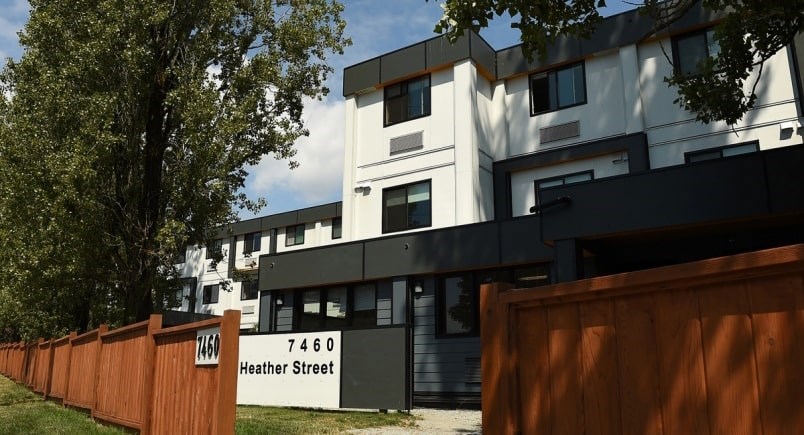The B.C. government released a report Tuesday that says temporary modular housing buildings in Vancouver and Surrey are improving the quality of life for tenants and reducing their use of emergency services.
 The B.C. government released a report Tuesday touting the success of temporary modular housing buildings in Vancouver and Surrey. Pictured is the Reiderman Residences in Marpole. Photo Dan Toulgoet
The B.C. government released a report Tuesday touting the success of temporary modular housing buildings in Vancouver and Surrey. Pictured is the Reiderman Residences in Marpole. Photo Dan Toulgoet
The government’s conclusion was based on surveys it did of tenants and staff in four modular housing buildings in Vancouver and three in Surrey. The data was collected six months after tenants moved into their homes.
Many of the tenants – 79 per cent – were previously homeless.
“I am very pleased to see these outcomes, which confirm we are on the right path in addressing homelessness in B.C.,” said B.C. Housing Minister Selina Robinson in a news release that accompanied the report.
Some of the key outcomes include:
- 94 per cent of residents remained housed in their homes after six months.
- 84 per cent reported improvements in their overall well-being.
- 82 per cent said they experienced positive interactions with neighbours.
- 56 per cent noticed an improvement in their physical health.
- 44 per cent said they had been admitted to hospital less often.
- 44 per cent reported improvements in their mental health.
- 39 per cent reported improvements in their “addiction issues.”
The report notes the findings were based on a voluntary tenant survey, with a 41 per cent response rate across the seven buildings. Three staff from each building was interviewed.
“The outcomes are based on residents who moved into the buildings when they opened,” the report said. “Outcomes may change over time as the residents within the building change.”
Participants in the survey included tenants and staff of the Reiderman Residences in the 7400-block Heather Street, Sarah Ross House at 4480 Kaslo St., Chartrand Place at 1131 Franklin St. and Aneki Housing for Women at 525 Powell St.
The number of units in those four buildings totals 207.
The report included summaries of responses from each of the buildings, including the 77-unit Reiderman complex in Marpole. Only 32 per cent of Reiderman tenants – most of whom are seniors and people living with disabilities – participated in the survey.
Of those tenants, 88 per cent said their overall well-being improved, 33 per cent said they had better access to employment opportunities and 40 per cent reported better access to education.
In fact, seven residents found a job.
Fifty-eight per cent of tenants reported improvements to their mental health and 44 per cent to their physical health.
Challenges identified were a lack of nearby transit options, particularly from some elderly residents and others who aren’t mobile. Some have been unable to shop for groceries, although staff has connected residents with bus pass programs, Meals on Wheels and HandyDart.
“Some Reiderman residents experienced challenges in adjusting to living in stable housing after experiencing homelessness,” the report said. “Reiderman staff reported that moving from an outdoor lifestyle to an indoor lifestyle was difficult for some, especially if they had lived outside for many years.”
The survey doesn’t indicate whether neighbours of the seven buildings were interviewed, although the City of Vancouver has plans to hire a consultant to gauge whether neighbours of Reiderman have the same opinion and level of concern they had when the complex was in the proposal stage in 2017.
Reiderman opened in the spring of 2018, despite earlier protests and unsuccessful court action by a group of residents opposed to the location of the complex because of its proximity to three schools.
As the Courier reported in July, the city also plans to have a consultant interview residents who live near three other Vancouver modular housing complexes at 2132 Ash St., 5077 and 5095 Heather St. and the Sarah Ross House.
At last count, Vancouver’s 10 B.C. government-owned temporary modular housing buildings had a combined population of 605 tenants. The city is proposing to open another building – 50 studio units for singles – near the Nanaimo SkyTrain station, which has generated pushback from some neighbours.
The cost to develop the 10 sites to accommodate the buildings was $88 million.
@Howellings



